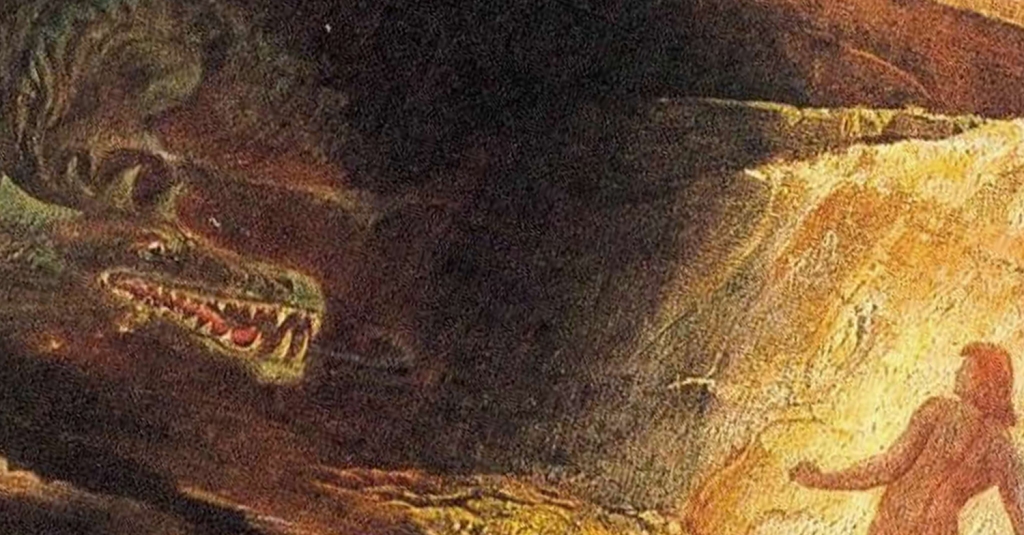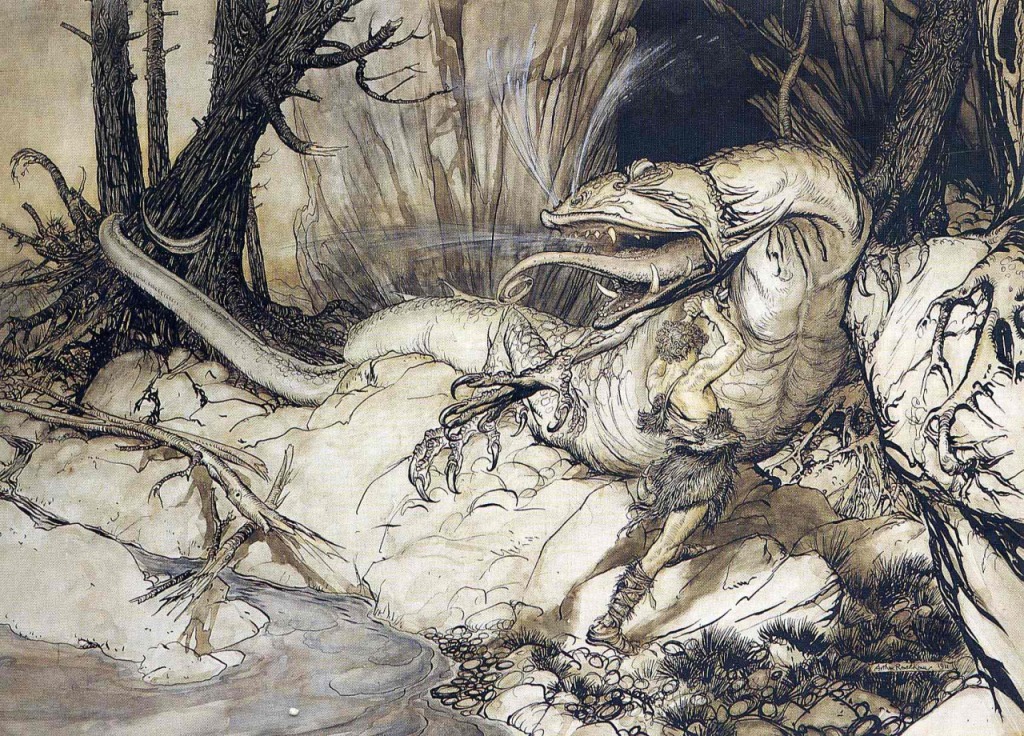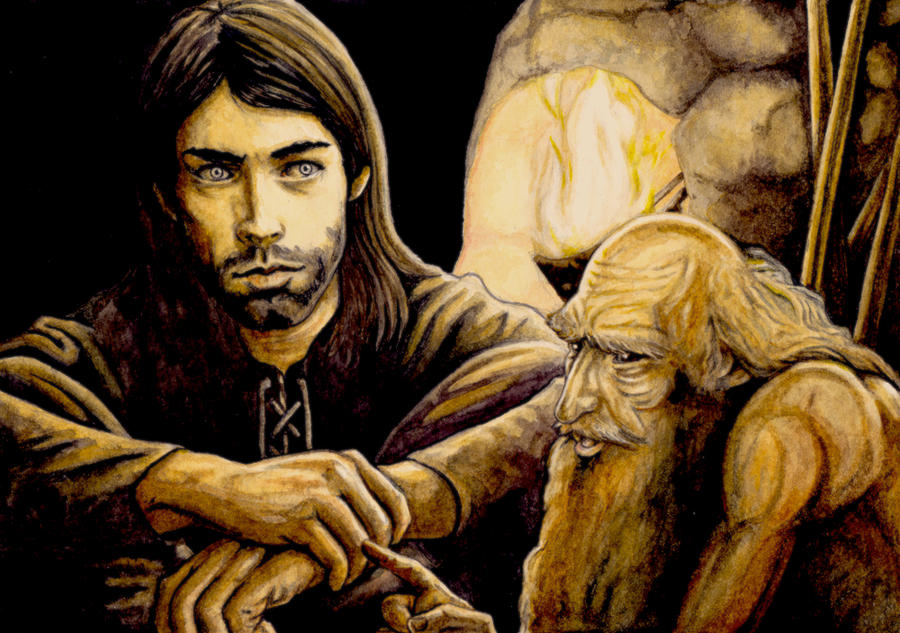After having completed my Master’s thesis and receiving my degree from Signum University, I have chosen to share what exactly I had been working on the last eight months of the program. This post consists of the core argument, the main sources that I was in conversation with, the approaches utilized in my thesis, and some conclusions that I had arrived at. The thesis itself has been reworked since submittal and is currently in the process of hopefully being published in a journal so will not be shared here. As I thought it was an interesting topic and not something that, to my knowledge, any other scholar had tackled before, I wished to share some of the process that went into writing my thesis.
The argument concentrates on the question of what the importance is of characters’ use of speech-acts and the power of using language in faith to sub-create in key moments in The Lord of the Rings.
In Verlyn Flieger’s book Splintered Light, she makes it explicit that light and word (logos) are connected in creation and part of the essential elements of Tolkien’s Legendarium, and it was one of the most important sources for my thesis, as she discusses the power of language in sub-creation. Her ideas are crucial to understanding the significance of Frodo and Sam’s utilization of naming and the authority that invoking the names of higher powers has. Flieger does make connections between the Gospel of John and logos in creation, but she does not go as far as to include the more important Christian concept of having faith when performing a speech-act and the consequences thereof in sub-creation.
Jonathan McIntosh’s book The Flame Imperishable was especially important for my research in the aspect of connecting Tolkien’s Christianity with the concept of sub-creation and the necessity of faith and reason in sub-creation which begins with the logos. While a valuable source for my thesis, McIntosh does not go deep enough into the power of words themselves as elements for creation or sub-creation, although he does continuously return to the “Eä!”spoken by Ilúvatar that sets the world into motion. This is not a detriment to his overall argument, as he is mostly focused on the theological background of creation and not the philosophy of language, but it does inspire further research to unite the language factor into the theological, which my thesis achieves.
In Tolkien’s Sacramental Vision, Craig Bernthal’s logos-centric universe connects the concepts of the word, prayer, and faith in sub-creation. His book was important for my research in the aspect of joining Tolkien’s Christianity with the concept of sub-creation and the necessity of having faith which begins with the logos. He explores many of the episodes in the Ainulindalë (in The Silmarillion) and Lord of the Rings that are crucial for my thesis, tying faith and the word as a way to explore speech-acts and sub-creation. While a valuable source for my thesis, Bernthal does not flesh out the spoken word of faith in its reason and logical necessity in the text and the act of creation or sub-creation, and of course does not center much of his argument specifically on the language aspect as he is mostly concerned with how all the sacraments fit into Tolkien’s narrative as a whole.
In Mark Wolf’s book Building Imaginary Worlds, he explores many different facets of sub-creation, emphasizing the role humans play as sub-creators who sub-create according to the power given by the Creator, and in exploring the imaginary world through sub-creation, we can ultimately discover kernels of truth about our own world. In his discussion of creation and the Word, he highlights the performative force that words have, and although he does not discuss speech-act theory, the same principle can apply to the power that words have to sub-create. Much of his argument is rooted in Tolkien’s theory of sub-creation and is helpful in the respect that they both believe in the importance that since human beings are created in the image of God, we sub-create based on the power given to us.
Owen Barfield’s Poetic Diction was also an important research tool concerning his theory of ancient semantic unity—words once being comprised of many different concepts that were then used metaphorically and had fragmented over time in concordance with humanity’s growing consciousness of itself and became separate words. This theory is also utilized by both Flieger and Bernthal in their arguments on the fragmentation of meaning concerning the word “logos” and its importance as the spoken word of creation in John’s Gospel as well as in Tolkien. All of the different meanings of logos can be applied, whether “word,” “logic,” or “organizing principle,” when thinking about how it is connected to creation and sub-creation in the secondary world of Middle-earth.
The Lord of the Rings has long been studied through the lens of Christianity as the core interpretation of the text and how humanity, being created by God, has the desire to imitate the Creator in their own sub-creations. However, there is a necessity to closely analyze the rationale of having faith in the act of sub-creation through the logos, represented as both the word and reason in creation and connect this to J. L. Austin’s speech-act theory within the text. I investigate the relationship of sub-creation and speech-acts, which I believe is an important topic because when one is speaking, it is not only to say some words, but by the act of speaking, one is performing through words which produce consequential effects by the speaker.
Along with performing through words, there is also the concept of faith in the act of naming by Frodo and Sam in Lord of the Rings, with the words having the power to draw back evil. Tom Bombadil also utilizes the power of words through his songs. All of these instances highlight that through words, characters are performing speech-acts and sub-creating, which draws from the source of Ilúvatar who first created through the Music and by the word, “Eä!” in the Ainulindalë. This connection between sub-creation and speech-acts does not seem to have been explored much, if at all, in Tolkien studies, especially through the lens of J.L. Austin’s speech-act theory, in discovering how together they are tied to the Christian element of creation by the word.
The frameworks I used included J.L. Austin’s speech-act theory, as illustrated in How to Do Things with Words, as the main approach to examining the power of words in both The Silmarillion and The Lord of the Rings; utilized a close reading textual analysis; incorporated the previous work of other academic in Tolkien studies such as Verlyn Flieger in Splintered Light, Jonathan McIntosh in The Flame Imperishable, and Craig Bernthal in Tolkien’s Sacramental Vision; utilized Tolkien’s theory of sub-creation as addressed in his essay “On Fairy-Stories” and his poem “Mythopoeia”; and investigated a Christian reading as the core interpretation of The Lord of the Rings. This is done through:
- Selecting and analyzing appropriate sections of Tolkien’s work in the use of speech-acts and sub-creation as a consequence of said speech-act.
- Conducting a thorough literature review of different scholars’ arguments and how they relate to my topic and where they do not go far enough for my contributions.
- Critically analyzing the creation stories of Genesis and the Gospel of John and the concept of logos in creation and sub-creation and comparing said research with The Silmarillion and The Lord of the Rings in their influence on Tolkien.
- Introducing content from Tolkien’s essays and statements on the topic of his faith to contribute to my argument of what role it played in his Legendarium and what he saw his purpose to be in addressing this topic.
The organizing principle of my thesis is around sub-creation and the different aspects of such as they interact within the text, whether through speech-acts, as the sub-creation of the Ainur after having been ordered by the logos in creation to sub-create, or in the act of naming. My thesis begins by explaining J.L. Austin’s speech-act theory to provide the background for the concepts that I am introducing through the power of words in the exploratory process within The Silmarillion and The Lord of the Rings. From here, I delve into the concept of sub-creation of imaginary worlds and Tolkien’s process of mythopoesis in “On Fairy-Stories” and “Mythopoeia” as it relates to Mark Wolf’s model and Owen Barfield’s theory of language in ancient semantic unity and the creation of meaning. I then explore the necessary ingredients of the word, faith, and reason in sub-creation, as other scholars have described, and survey the multiple meanings of logos as they pertain to sub-creation and events in the texts.
With all of this background information clearly defined in understanding the theory of sub-creation, I then apply this knowledge to examples in the text starting with the Ainulindalë and the creation of the world as a speech-act of Ilúvatar which begins the process of sub-creation through words by his creation. From here, I explore examples within The Lord of the Rings with Frodo, Tom Bombadil, and Sam as they harness the power of speech-acts to sub-create the power to rebuke the forces of evil. In the case of Frodo and Sam, they are also relying on their words of faith as a kind of prayer to a higher power that intercedes on their behalf.
From what I have gathered, I conclude that through the power of the spoken word, the original speech-act made by God brought all of creation into being; and because all of humanity was made in the image of God, and language being a gift of the Creator, we also use our words in faith by the power of the logos to sub-create in our own speech-acts. In Tolkien’s Legendarium, the word of creation works in the same way, as Ilúvatar’s speech-act then allows for his creation to sub-create by the power he endows to them; Frodo, Sam, and Tom Bombadil then use language based on faith to call upon a higher power to act through them or, in Bombadil’s case, by the exercise of his own power, to rebuke the forces of evil. Although there is still research that can be done in speech-act theory and prayer as a speech-act, by praying in faith, there is courage and hope for the things unseen which the Creator then performs according to his will, whether God in the Bible or Tolkien’s Ilúvatar.




